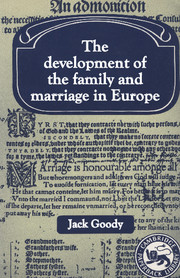Book contents
- Frontmatter
- Contents
- List of figures, maps and tables
- Preface
- 1 Perspectives
- 2 Two sides to the Mediterranean
- 3 Change in the German lands
- 4 Cousins and widows, adoptees and concubines
- 5 From sect to Church
- 6 Church, land and family in the West
- 7 Reformation and reform
- 8 The hidden economy of kinship
- 9 The spiritual and the natural
- Appendix 1 Kin groups: clans, lineages and lignages
- Appendix 2 From brideprice to dowry?
- Appendix 3 ‘Bilaterality’ and the development of English kin terminology
- References and bibliography
- Glossary
- Index
9 - The spiritual and the natural
Published online by Cambridge University Press: 05 June 2012
- Frontmatter
- Contents
- List of figures, maps and tables
- Preface
- 1 Perspectives
- 2 Two sides to the Mediterranean
- 3 Change in the German lands
- 4 Cousins and widows, adoptees and concubines
- 5 From sect to Church
- 6 Church, land and family in the West
- 7 Reformation and reform
- 8 The hidden economy of kinship
- 9 The spiritual and the natural
- Appendix 1 Kin groups: clans, lineages and lignages
- Appendix 2 From brideprice to dowry?
- Appendix 3 ‘Bilaterality’ and the development of English kin terminology
- References and bibliography
- Glossary
- Index
Summary
There is one feature particular to Europe which I have not discussed, partly because it is so significant that the issues it raises serve to summarise the central argument. For this striking feature was the distinctive, perhaps unique, way in which kin terms and practices were transferred to the religious domain. Such ‘extensions’ are not unknown in other societies especially in the sphere of politics where a king or chief may be perceived as the ‘father’ or ‘grandfather’ of his people. But in Christianity, kin terms were used not only for addressing the gods and the priesthood, but also for addressing all the fellow-members of the sect, and later those specially chosen as spiritual kin or godkin. God the Father is served by priests and helpers who are ‘fathers’ and ‘brothers’, ‘mothers’ and ‘sisters’. The Head of the Church is il Papa, the Pope; the head of the monastery is called the Abbot, again a ‘father’, derived from the Aramaic abbā. Fellow members of the early Church were ‘brothers’ and ‘sisters’, while those chosen to be the godparents of one's children were compatres and commatres, the godchildren themselves being filiolagium, and the fellow godchildren forming a ‘confraternity’ of ‘godsibs’ or ‘gossips’. And the changes in ‘natural’ kinship which occurred throughout Europe from Augustine's time on, were also embodied in the practices of spiritual kinship.
- Type
- Chapter
- Information
- The Development of the Family and Marriage in Europe , pp. 194 - 221Publisher: Cambridge University PressPrint publication year: 1983
- 1
- Cited by

